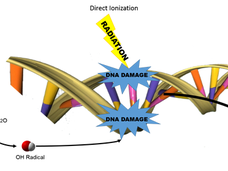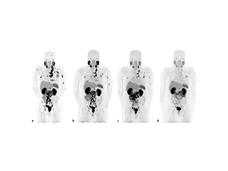| Cancer Information Highlights |
| From the National Cancer Institute |
| Updating you about cancer causes, prevention, screening, treatment, coping, and more |
| |
| New from NCI |
| Avasopasem Shields Normal Cells from Radiation, Helps Kill Cancer Cells |
 |
|
In new studies in mice, researchers found that a drug called avasopasem manganese, which has been found to protect normal cells from radiation therapy, can also make cancer cells more vulnerable to radiation treatment. |
| Radiopharmaceutical Improves How Long Some with Advanced Prostate Cancer Survive |
 |
|
A drug called 177Lu-PSMA-617 may be a new option for treating advanced prostate cancer. In a large clinical trial, adding the drug—a type of radiopharmaceutical—to standard treatments improved how long people with the disease lived. |
| Eliminating Cancer Health Disparities Takes All of Us |
 |
|
Learn about the progress made and what’s still needed to build equity in cancer research and care. Also, read about Dr. Shobha Srinivasan’s work to combat mistrust in rural communities. |
Approval of KRAS Inhibitor for Lung Cancer
The Food and Drug Administration (FDA) has approved the first KRAS-blocking drug, sotorasib (Lumakras). The approval, which covers the use of sotorasib to treat some people with advanced lung cancer, sets the stage for other KRAS inhibitors already in development. |
Cryosurgery to Treat Cancer
This updated page defines cryosurgery and explains the types of cancer it is used to treat. Learn how cryosurgery works, benefits and drawbacks, and possible side effects. |
Photodynamic Therapy to Treat Cancer
This updated page defines photodynamic therapy and explains how it works. Learn about the types of cancer and precancers that photodynamic therapy treats and benefits and drawbacks.
|
|
| |
| Also of Interest |
Coronavirus Vaccines and People with Cancer
Many people being treated for cancer are asking whether they should get a COVID-19 vaccine. On this page, an expert answers questions and responds to concerns about the vaccine. |
Resources for Caregivers
Information to help you care for yourself and the person with cancer in your life. Includes links to more information about cancer and the latest in cancer research. |
Contact Us for Help
Information specialists at NCI’s Cancer Information Service (CIS), NCI's contact center, are available to help answer your cancer-related questions in English and Spanish. Reach us by phone, chat, or email. |
|
|
|
|
|